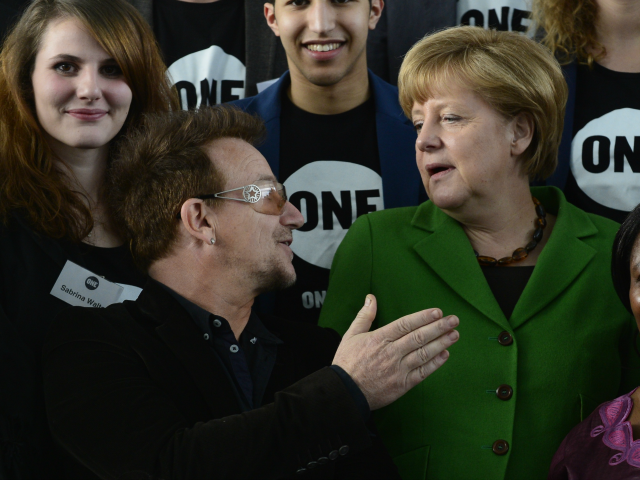The global political establishment is rolling out its big guns on the issue of Britain leaving the European Union and the migrant crisis today, with billionaire left-wing donor George Soros, the International Monetary Fund (IMF), and now U2 singer Bono chiming in on the two issues.
Writing in the New York Times today, Bono, who is due to testify in front of the U.S. House of Representatives later today on his views on the migrant crisis, said:
I’ve recently returned from the Middle East and East Africa, where I visited a number of refugee camps — car parks of humanity. I went as an activist and as a European. Because Europeans have come to realize — quite painfully in the past year or two — that the mass exodus from collapsed countries like Syria is not just a Middle Eastern or African problem, it’s a European problem. It’s an American one, too. It affects us all.
My countryman Peter Sutherland, a senior United Nations official for international migration, has made clear that we’re living through the worst crisis of forced displacement since World War II. In 2010, some 10,000 people worldwide fled their homes every day, on average. Which sounds like a lot — until you consider that four years later, that number had quadrupled. And when people are driven out of their homes by violence, poverty and instability, they take themselves and their despair elsewhere. And “elsewhere” can be anywhere.
The Irish singer outlined three areas in which he believed the United States should lead the way for Europe on the migrant crisis, specifically talking about letting more migrants into Europe, pushing more pro-migrant propaganda onto the people of Europe, and indeed begging the United States for a new “Marshall Plan” – an injection of cash designed to shore up failing nations in the Middle East and Africa.
He continues:
…I see three areas where the world should act:
First, the refugees, and the countries where they’re living, need more humanitarian support. You see this most vividly in a place like the Dadaab complex in Kenya, near the border of Somalia, a place patched together (or not) with sticks and plastic sheets. The Office of the United Nations High Commissioner for Refugees is doing noble and exceedingly hard work. But it can’t do everything it needs to do when it is chronically underfunded by the very governments that expect it to handle this global problem.
Second, we can help host countries see refugees not just as a burden, but as a benefit. The international community could be doing much more, through development assistance and trade deals, to encourage businesses and states hosting refugees to see the upside of people’s hands being occupied and not idle (the World Bank and the Scriptures agree on this). The refugees want to work. They were shopkeepers, teachers and musicians at home, and want to be these things again, or maybe become new things — if they can get education, training and access to the labor market.
In other words, they need development. Development that invests in them and empowers them — that treats them not as passive recipients but as leaders and partners. The world tends to give humanitarian efforts and development efforts their own separate bureaucracies and unlisted phone numbers, as if they’re wholly separate concerns. But to be effective they need to be better coordinated; we have to link the two and fund them both. Refugees living in camps need food and shelter right away, but they also need the long-term benefits of education, training, jobs and financial security.
Third, the world needs to shore up the development assistance it gives to those countries that have not collapsed but are racked by conflict, corruption and weak governance. These countries may yet spiral into anarchy. Lately some Western governments have been cutting overseas aid to spend money instead on asylum-seekers within their borders. But it is less expensive to invest in stability than to confront instability. Transparency, respect for rule of law, and a free and independent media are also crucial to the survival of countries on the periphery of chaos. Because chaos, as we know all too well, is contagious.
What we don’t want and can’t afford is to have important countries in the Sahel, the band of countries just south of the Sahara, going the same way as Syria. If Nigeria, a country many times larger than Syria, were to fracture as a result of groups like Boko Haram, we are going to wish we had been thinking bigger before the storm.
Actually, some people are thinking bigger. I keep hearing calls from a real gathering of forces — Africans and Europeans, army generals and World Bank and International Monetary Fund officials — to emulate that most genius of American ideas, the Marshall Plan. That plan delivered trade and development in service of security — in places where institutions were broken and hope had been lost. Well, hope is not lost in the Middle East and North Africa, not yet, not even where it’s held together by string. But hope is getting impatient. We should be, too.
Listen to the discussion of this article on Breitbart News Daily on SiriusXM:

COMMENTS
Please let us know if you're having issues with commenting.